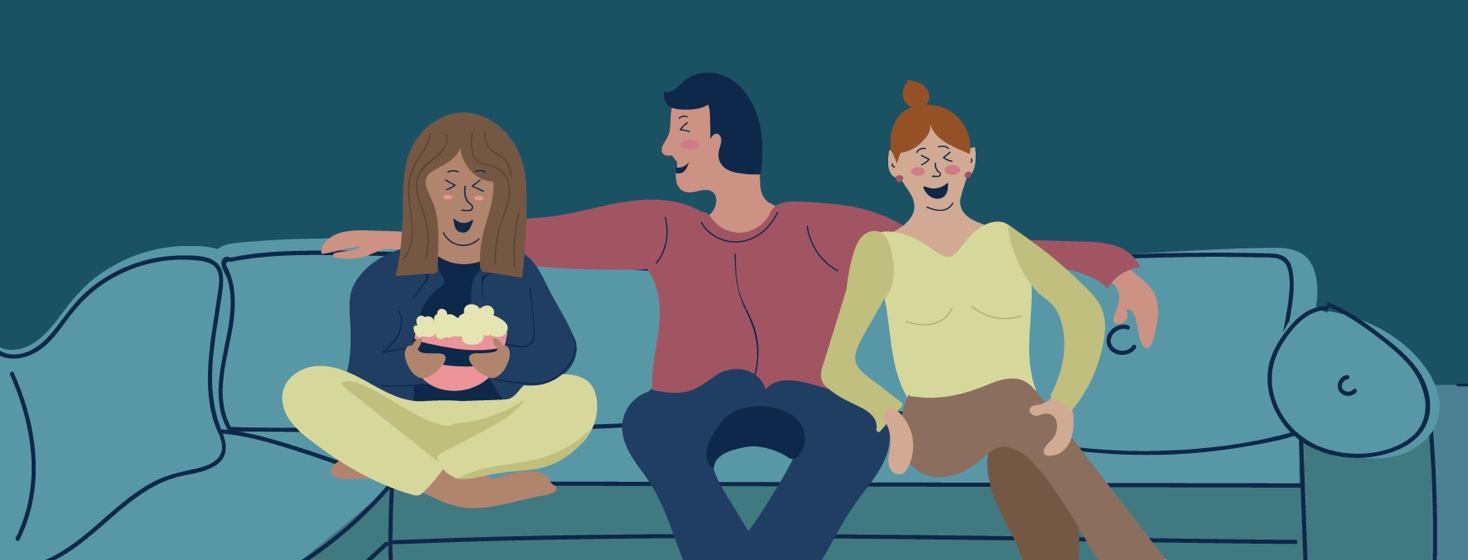A Dose of Laughter

Living with a chronic health condition can take a toll on your mental health. Life often seems full of the things you cannot do anymore, the ways the disease compromises your life and the many stresses that the disease adds to life. When it all feels like too much, have you ever stopped and tried to laugh?
Why do we laugh?
We laugh as a reaction to something that occurs, either visually or physically. There are three main categories within the theory of why people laugh. They can be broken into arousal, discrepancy, and superiority.1-2
Arousal
This is the category that is most familiar. When the body is under stress it is regarded as being in a state of arousal, such as fight or flight. Laughter can help relieve some of that tension and reduce the stress of a particular situation.
Inez is feeling worried as she waits for the results of her recent biopsy. Her daughter is making popcorn in the air popper and it explodes all over the kitchen. They both dissolve in a fit of giggles as the dog and cat try to compete to clean up the most popcorn before being hauled off. Suddenly, Inez does not feel so overwhelmed and worried, smiling as she and her daughter clean up the kitchen.1-2
Discrepancy
This category is when laughter is the result of misunderstanding or when encountering something unexpected. Often, jokes fall into this category.
A man in a restaurant calls out, “Waiter! What’s that fly doing in my soup?!”
The waiter looks and responds, “The backstroke, I think.”
This is discrepancy humor as it does not give an expected response.1-2
Superiority
This category is laughter when people look down on those they perceive to be beneath them. Laughter in this context is meant to separate “us” from “them.” This form of laughter is often employed in comedy shows. For example, The Big Bang Theory is funny, in part because of the social awkwardness of the main characters.
We laugh because, however socially inept we may be at times, we do not follow in the footsteps of Sheldon Cooper creating a roommate contract outlining when each person is allowed to use the bathroom. We feel socially superior and therefore, laugh.1-2
Why laughing helps you feel good
Laughing has many positive effects on the body and its systems. Laughing can:
- Decrease stress hormones
- Improve respiration and circulation
- Increase the immune system
- Relax and exercise the muscles
- Improve mental function
In addition to being good for the physical body, it can also boost your mood and mental capacity! Laughing decreases stress and anxiety and can reduce feelings of depression. Laughing can improve your creative thinking and memory. Laughing improves your interactions with friends and loved ones. Laughing can help your overall outlook and feelings of well-being.1
Different kinds of laughter
There are five different kinds of laughter that you can experience and engage in:1
- Spontaneous laughter — this is laughter that randomly occurs when you react to something funny, such as a friend telling a joke or amusing story or watching a silly video.
- Simulated laughter — this is when you make yourself laugh just to laugh, knowing it will release endorphins and may boost your mood.
- Stimulated laughter — this is any physical action that causes you to laugh, the most common being tickling.
- Induced laughter — this is any laughter that is the result of taking specific drugs or foods, such as caffeine, alcohol, marijuana, or laughing gas (to name a few).
- Pathological laughter — this is the result of injuries to the central nervous system and is an unintentional reaction of the body. There is nothing that seems to set it off and it cannot be stopped at will.
Laughter is low risk
In a world where so many different medications are prescribed to treat chronic illness, that come with a variety of different side effects, doctors are finding laughter an easy, inexpensive prescription to recommend. Laughter is free! It can help you connect to others and lighten your mood.
There are practically no side effects (other than possibly a sore jaw or an aching side if the laughter goes on too long or strongly). Laughter does not require any specialized equipment, labs, or facility to administer. So, have a laugh! See how you feel!1-2

Join the conversation